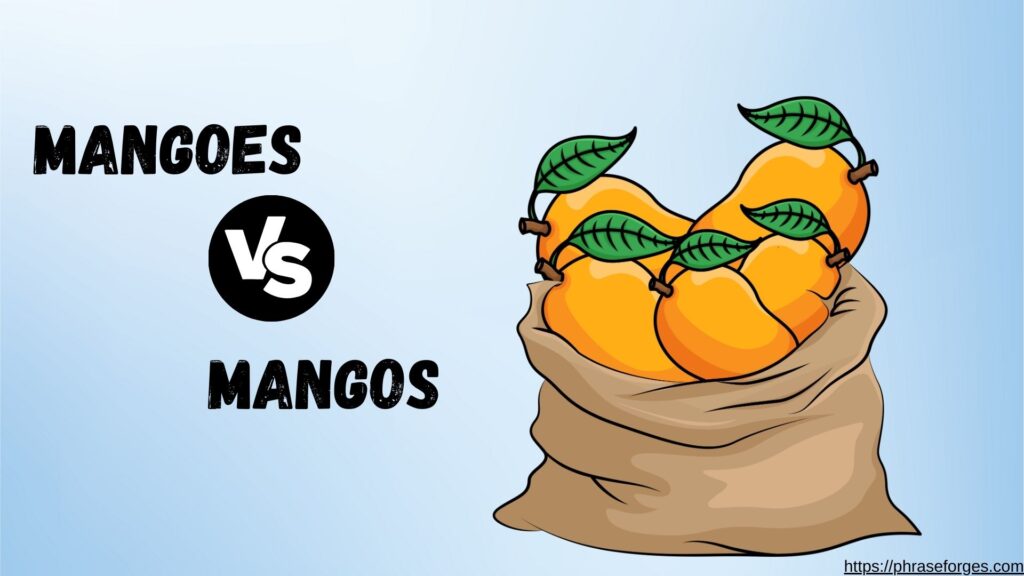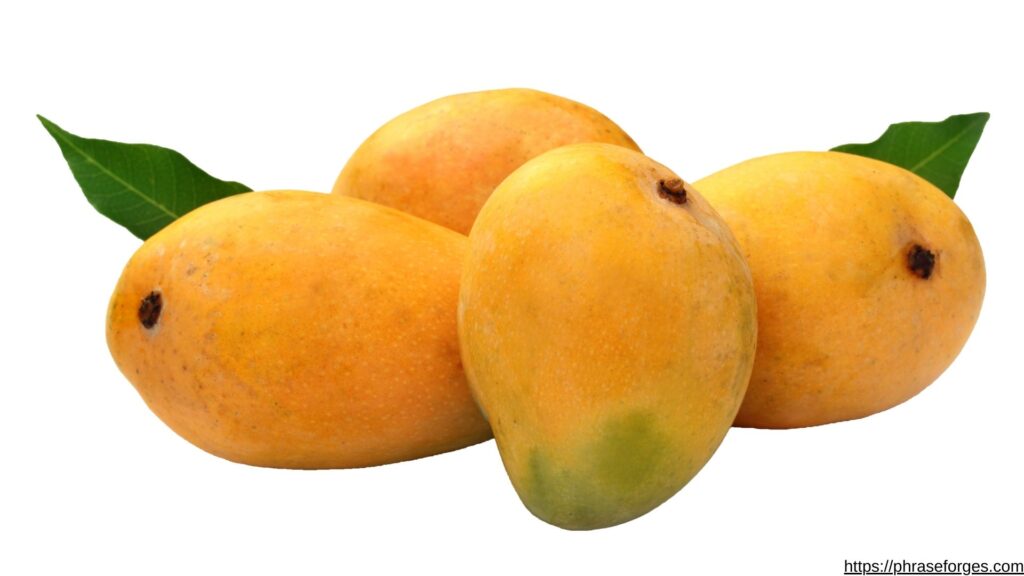Let’s clear this up right away: both “mangoes” and “mangos” are correct plurals of the word mango. Confusing, right? But English is full of little quirks like this.
Still, if you’re unsure which form to use or whether one is more “proper” than the other this article will break it all down, with examples, spelling rules, and even a few real-life scenarios. So, let’s dig into the delicious grammar of the mango plural form.
Why Are There Two Plurals for Mango?

The reason behind the dual forms mangoes and mangos boils down to English spelling conventions for nouns ending in -o.
Typically:
- If a noun ends in -o and follows a vowel, just add -s (like “studio” → “studios”).
- If it ends in -o and follows a consonant, you usually add -es (like “tomato” → “tomatoes”).
But—and here’s the twist—some nouns ending in -o give you both options, and mango is one of them. It’s a countable noun, so we do pluralize it. But the form? That’s flexible.
Mangoes vs. Mangos: Which Should You Use?

Both spellings are valid, but “mangoes” is more common in British English, and “mangos” appears more often in American English. That said, even in the U.S., “mangoes” still dominates formal writing, especially in academic, culinary, or trade contexts.
📊 Quick Comparison:
| Plural Form | Accepted? | Used in? |
|---|---|---|
| Mangoes | ✅ | UK English, global use |
| Mangos | ✅ | US English (informal, modern use) |
Spelling Rule Refresher: Nouns Ending in -O
Here’s a quick rundown of noun pluralization rules when dealing with -o ending nouns:
- Add -es: potatoes, tomatoes, heroes, echoes
- Add -s: pianos, photos, avocados, radios
- Both accepted: volcanoes/volcanos, tornadoes/tornados, mangoes/mangos
So, if you’re ever unsure about the plural rules for -o ending nouns, a quick check in the dictionary can save you.
Real-World Scenario: Formal Email Example
Let’s imagine you work for a fruit export company, and you’re writing a formal email to a new distributor in London:
Subject: Shipment of Fresh Mangoes – Invoice Attached
Dear Mr. Patel,
I hope this message finds you well.
Attached is the invoice for your recent order of South Asian mangoes, scheduled for dispatch this Friday. All mangoes are certified Grade A and sourced directly from farms in Multan and Ratnagiri.
Please review the document and let us know if there are any discrepancies.
Warm regards,
Nadia Ameen
Export Coordinator
Global Tropic Produce
Notice how “mangoes” fits naturally in a formal tone and international setting.
Informal Example: A Text Message
Now let’s switch gears. Imagine you’re texting a friend about smoothie ingredients:
Hey Jordan!
Just picked up bananas, pineapples, and two juicy mangos 🍑
Wanna come over and make tropical smoothies?
Here, “mangos” feels casual, relaxed and totally correct.
Mango in a Sentence: Example Sentences of Mangoes
Let’s look at a few examples showing mango in both singular and plural forms:
- “This mango is so ripe it practically melts in your mouth.”
- “I love cutting up mangoes and storing them in the freezer for smoothies.”
- “Do you prefer your mango fresh or in juice form?”
- “We bought a box of Alphonso mangoes at the farmers’ market.”
These mango sentence examples demonstrate how the word flows naturally in real conversations.
How to Pluralize Mango: Quick Tip
If you’re still unsure which to use, here’s a memory hack:
“Go with mangoes when writing formal; stick to mangos when texting or being casual.”
Still confused? Just imagine a tango with mangos that playful rhyme helps remember that either one works, depending on the tone you need.
Origin of Mango: Etymology Matters Too

Did you know the word mango comes from the Portuguese “manga”, which was adopted into English in the late 16th century? That makes it a loanword with centuries of linguistic evolution behind it. So, like many borrowed words, it doesn’t always follow the rules to a T.
The etymology of mango helps explain why both mangoes and mangos have stuck around.
Mango in Cooking, Trade, and Culture
Mangoes or mangos aren’t just fruits. They’re a global commodity.
From dried mango snacks in Thailand to mango pulp in Indian sweets, the fruit plays a huge role in culinary and trade industries.
Here are some common uses:
- In cooking: Mango chutney, salsa, smoothies, salads
- In trade: Exported as fresh fruit, pulp, juice concentrate
- In medicine: Rich in antioxidants and Vitamin A
In reports or culinary books, you’ll nearly always see “mangoes”.
Which Dictionaries Prefer Which Form?
Curious how major dictionaries handle the correct plural form of mango?
- Merriam-Webster: Lists both “mangos” and “mangoes”
- Oxford English Dictionary: Prioritizes “mangoes”
- Cambridge Dictionary: Uses “mangoes” in examples
So yes both are correct, and even the dictionaries can’t choose a winner.
Fun Fact: Foods Ending in -O with Plural -ES
Here’s a mini-list of foods that follow the -es rule just like “mangoes”:
| Singular | Plural |
|---|---|
| Tomato | Tomatoes |
| Potato | Potatoes |
| Mango | Mangoes/Mangos |
| Hero | Heroes |
| Echo | Echoes |
Some spelling guides recommend following consistency: if you’re using “tomatoes,” you might as well go with “mangoes.”
So, Which Should You Use? Final Thoughts
Use “mangoes” if:
- You’re writing formally
- It’s a professional or academic context
- You want to align with UK usage or international audiences
Use “mangos” if:
- You’re writing casually or informally
- You’re aiming for brevity (like in text or casual marketing)
- You prefer modern American spelling
At the end of the day, there’s no wrong answer. Whether you write about mangos ripening under a tropical sun or mangoes piled in baskets, your meaning will be clear and your spelling will still be correct.
✅ TL;DR – Quick Recap
- What is the plural of mango? → Both mangoes and mangos
- Which is more common? → “Mangoes,” especially in formal writing
- Which is easier to remember? → Picture a tango with mangos 🥭💃
- Which one should you use? → Depends on your tone and audience
Let your taste in grammar be as good as your taste in fruit use what fits the flavor of your sentence.
Need more grammar tips on irregular plural nouns, -s / -es suffix rules, or other fruity language quirks? Stick around. English is full of delicious surprises. 🍍🍓🥭

